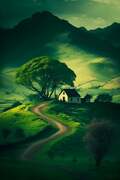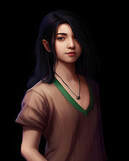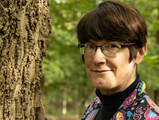| I’m not a fan of the grimdark worlds of dystopian fiction filled with suffering and pain, where a solitary hero (or chosen few) struggle to survive: 1984, The Handmaid’s Tale, Lord of the Flies, The Traitor Baru Cormorant, Mistborn, etc. I prefer to hope for (and write about) a future where refugees fleeing danger (in Ukraine, Syria, Sudan, El Salvador, Guatemala, Honduras, and elsewhere) find peaceful, productive lives; where we use our creativity and ingenuity to create a better world (Star Trek, Solarpunk Magazine, Ethan of Athos, Always Coming Home, The Fifth Sacred Thing). |
As Jill Leopold points out in her New Yorker Magazine article: “Dystopia [is] a fiction of submission, the fiction of an untrusting, lonely, and sullen twenty-first century, the fiction of fake news and infowars, the fiction of helplessness and hopelessness. It cannot imagine a better future, and it doesn’t ask anyone to bother to make one.”
| In a recent essay, Phil Athans notes that we have a responsibility as writers to consciously advocate for the oppressed and marginalized: “science fiction and fantasy worldbuilding in general is and always has been, at least to some degree, an activist project.” He commends “authors working to bring a more enlightened and inclusive, more contemporary view of gender into genre fiction.” A worthy goal in this era of radical conservative transphobia. |



 RSS Feed
RSS Feed